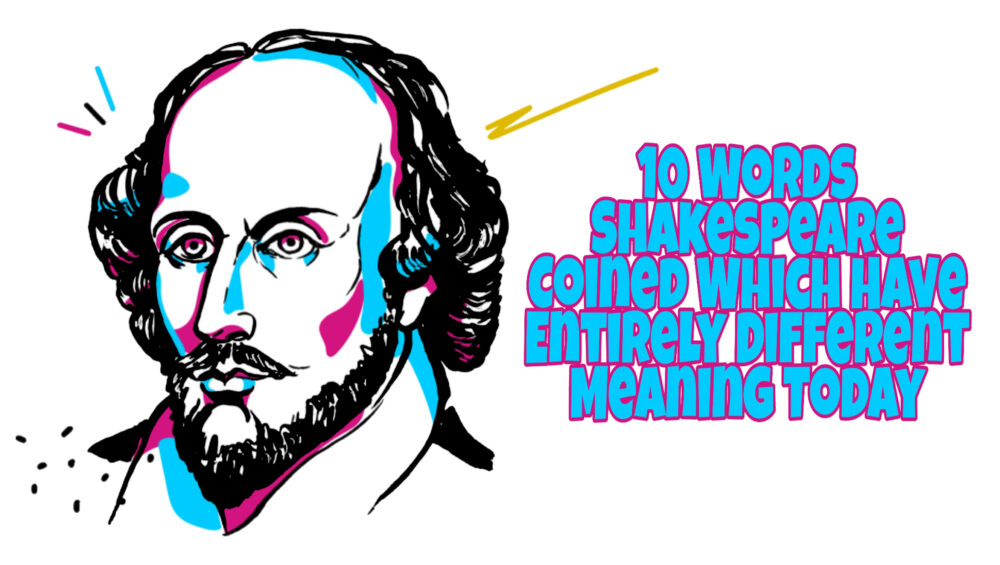No student pass his/her elementary or secondary school life without getting acquainted with the literary genius, William Shakespeare. He wrote 37 plays and hundreds of poems which gave the readers a very large set of vocabulary. Many are of the belief that there are as many as 422 words in the English language we use today which were first coined by Shakespeare. But what’s noteworthy is that the context Shakespeare used those words in has changed to a great extent.

Hence today TSA bring you 10 such words which were coined by Shakespeare with a particular context but they evolved to mean something entirely different over all these years.
S.N. |
Word |
Shakespeare |
Modern Day |
||
Meaning |
Usage |
Meaning |
Usage |
||
| 1. | Abhor (v.) | To protest. | Henry VIII, Act 2 Scene 4, Queen Katharine to Cardinal Wolsey:
Therefore I say again, |
To disgust, hate. | People who seek peace abhor violence. |
| 2. | Addition (n.) | Title | Macbeth, Act 1 Scene 3, Ross to Macbeth:
And, for an earnest of a greater honor, He bade me, from him, call thee thane of Cawdor: In which addition, hail, most worthy thane, For it is thine. |
The action or process of adding something to something else. | It would make a nice addition to their safari. |
| 3. | Addiction (n.) | Inclination, leaning, bent. | Henry V, Act 1 Scene 1, Canterbury to Ely:
Which is a wonder how his Grace should glean it,Since his addiction was to courses vain,His companies unlettered, rude, and shallow,His hours filled up with riots, banquets, sports, |
Dependant, obsessive need. | I have an addiction of drinking coffee every morning. |
| 4. | Advertisement (n.) | Advice, warning, instruction. | All’s Well That Ends Well, Parolles to the Lords:
That is not the duke’s letter, sir; that is an advertisement to a proper maid in Florence |
Announcement. | The brand’s advertisement boosted the sales. |
| 5. | Angel (n.) | Devil, Satan, evil spirit. | Macbeth, Act 5 Scene 8, Macduff to Macbeth:
Despair thy charm, And let the angel whom thou still hast served |
Good spirit, messenger of God. | I knew he would prove to be an angel for me. |
| 6. | Colour | Pretence. | Henry IV Part II, Act 5 Scene 5, Falstaff to Shallow:
Sir, I will be as good as my word. This that you heard was but a colour. |
Hue, shade, tint | Rainbow has 7 colours. |
| 7. | Commodity (n.)
|
Self interest, convenience, profit. | King John, Act 2 Scene 1, Bastard:
Till this advantage, this vile-drawing bias,595This sway of motion, this Commodity,Makes it take head from all indifferency,From all direction, purpose, course, intent:And this same bias, this Commodity,This bawd, this broker, this all-changing word, |
Material | Every commodity has a price. |
| 8. | Cry (n.) | Rumour, gossip, common report. | Othello, Act 4 Scene 1, Iago to Cassio:
Faith, the cry goes that you shall marry her. |
weep | She began to cry again. |
| 9. | Danger (n.) | Mercy, power.
|
The Merchant of Venice, Act 4 Scene 1, Portia disguised as Balthazar to Antonio:
You stand within his danger, do you not? |
Risk, possibility of harm or injury.
|
She didn’t know what danger she was in.
|
| 10. | Owe (n.) | Own. | Twelfth Night, Act 1 Scene 5, Olivia:
Fate, show thy force. Ourselves we do not owe. |
Obligation to pay. | I think you owe me an explanation. |
Also Checkout: Top 5 book recommendations by Barack Obama
Also Checkout: Pakistani Dramas breaking the stereotypes of a conservative society















